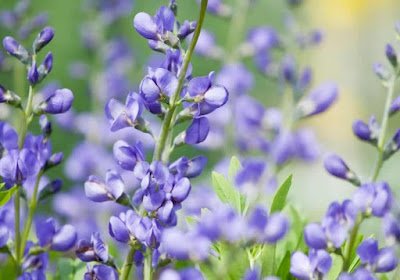Baptisia, A Garden Treasure
Baptisia australis earned its common name,
False Indigo, from the Cherokee Indians, who used this plant as a source of
blue dye. Its genus name, Baptisia,
comes from the Greek word ‘bapto’, which means ‘to dip or dye’.
To pronunce the name correctly, emphasize
the second syllable: bap-TEEZ-ee-uh.
This beautiful native plant is listed on the Royal Horticulture list of
top 100 plants over the last century, and is an excellent choice. Baptisia reaches 3-4 feet in height and
provides a great backdrop for other perennials in the garden.The rounded,
clover-like foliage is a blue-green color, and the flower, which appears
April-May, looks like sweetpeas.
Baptisia can be planted in light shade, but prefers full sun and can
handle poor soil, which we have plenty of around here.
Once established, Baptisia is fairly
drought tolerant, but does not care to be moved, due to the long tap-root it
sends down. Once the plant flowers, a
seed pod forms from each flower that looks, at first, like a broad pea
pod. The pod elongates and slowly turns
a grayish-black. You can have 25 or more
pods on one stalk. The seeds remain in
the pods, becoming loose and rattling in the breeze, giving it another name of
rattleweed of rattlebrush. Eventually in
late fall, the seeds fall free from the pods.
As early settlers made their way West, pods were picked and given to
toddlers as a toy, spreading this plant across the country. Fortunatly, this plant is not poisonous,
however, deer tend to stay away from it.
Currently, I have several varieties growing
in our display garden: the common Baptisia
australis with its indigo blue flowers, Purple smoke with dusty purple blooms,
Carolina Moonlight is a buttery yellow variety, Wayne’s World is pure white and
Grape Taffy is deep purple with a touch of yellow. I love them all and I want more.
If you are looking for a tall filler for a
perennial bed which provides architectural intrest, Baptisia may be the perfect
plant.

Comments
Post a Comment